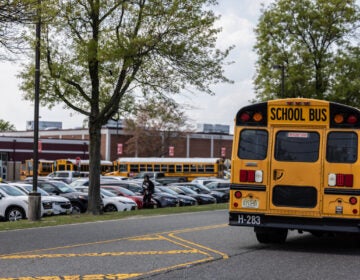Pa. Gov. Wolf says school ratings should be less tied to tests
Listen
Pa. Gov. Tom Wolf looks over a quilt made by Andrew Jackson Elementary School students in this 2014 file photo (Nathaniel Hamilton/for NewsWorks)
Pennsylvania Gov. Tom Wolf intends to steer the state away from school accountability measures that he says place too great an emphasis on standardized test scores.
Details of the new plan have not yet been released. Wolf says the state’s existing accountability tool — the School Performance Profile — doesn’t provide parents with a comprehensive view of school performance.
“Education is a full and holistic process. We’ve reduced it to a bunch of high-stakes tests that don’t seem to me to be tied to the specific, comprehensive skills that we want students to have,” said Wolf at a recent interview in the governor’s Philadelphia office.
The School Performance Profile system was unveiled by former Gov. Tom Corbett’s administration in October 2013, replacing the Adequate Yearly Progress measuring stick created by the federal No Child Left Behind law.
Both of these tools rely in large part on student performance on standardized tests. SPP was advanced by Corbett as an improvement over AYP in part because it considers a student’s improvement over time, not just raw scores.
Under the SPP system, every public school in Pennsylvania receives a score on a scale from 0 to 100, with room for additional “extra credit.” In addition to student performance on state tests (which account for 90 percent of SPP), schools earn points based on attendance, graduation rates, and participation in Advanced Placement courses and PSAT exams.
A recent report by Research for Action found schools that score well on the SPP score don’t serve many poor students. Even when analyzing the growth measures intended to show students making progress, low scores were strongly correlated to student poverty. This was the case for science and writing in elementary grades, as well as all subjects in high school.
“[The SPP metric] doesn’t seem to me to give teachers the freedom they need to adapt an education system to the specific challenges they’re meeting in that classroom, that day, that year,” said Wolf. “And it hasn’t necessarily gotten us to a point where we are turning out better students.”
Under Corbett, school funding was, in part, tied to a school districts’ aggregate SPP score. The “Ready to Learn” block grant, funding was divided up based on a need-based formula, but districts with lower scores were given the greatest restrictions for how to spend the cash.
Wolf’s proposed budget, which promised $2 billion in new preK-12 spending over four years, would do away with block-grants — channelling all funding through the basic education subsidy.
Wolf, who campaigned for office touting his experience running his family cabinet-making business, said he is actively working to revamp the accountability system by seeking input from teachers.
“In my own company, when I wanted to make my company better, the first place I went — not the last — the first place I went was the front lines…and I want to make sure we’re doing that in the education area,” said Wolf. “The one group of people that I don’t think have been brought into the conversation as fully as they should have been brought in is the educators.”
The Pennsylvania State Education Association, the state’s largest teachers’ union, lauded the proposed shift.
“Our members have continuously expressed a desire to reduce the emphasis on toxic testing in Pennsylvania’s public schools,” said PSEA spokesman Wythe Keever. “So we would support the kind of change in direction that Gov. Wolf is talking about, and look forward to hearing details.”
The Wolf administration believes it can revamp the SPP without the approval of the Republicans who control both houses of the state legislature, but invites their input. Wolf would need to gain, though, the blessing of the Obama administration.
Wolf says his ideal school rating tool would represent the “thorough and efficient” education that the Pennsylvania Constitution guarantees.
“I want [our] schools to be attractive features in the commonwealth so that people from the outside look at Pennsylvania and say, ‘That’s a place I want to come and live, that’s a place I want to set up a business, that’s a place I would be proud to have my kids go to school.'”
Steve Miskin, spokesman for the House Republican caucus, said lawmakers are “miffed” about Wolf’s proposed change.
“Taxpayers need to know that thier investment is yielding results, and that is one of the benefits of these tests,” said Miskin, who lamented Wolf’s lack of detail. “As governor, the time of talking in these platitudes is over.”
Last week, Wolf’s secretary of education sent a letter to Pennsylvania’s superintendents instructing them to submit plans detailing how they’d use the additional funding that the governor has proposed for next school year. Superintendents were given a list of “evidenced-based programs” and “benchmarks for student performance” from which to choose.
The accountability examples ranged from getting students to read on level by third grade to measuring how many students ultimately find employment.
“I agree that we need an accountability system,” said Wolf. “I just don’t agree that the accountability system that the prior administration had in place was the right one.”
Beginning this school year, Pennsylvania teachers have their yearly evaluations based in part on student achievement on standardized tests. Fifteen percent of the evaluation will come from how a teacher’s individual students perform and grow. Another fifteen percent will be based on the scores of a school’s overall student body.
The Wolf administration will also seek to make this process more comprehensive, but says no plan has been formalized.
WHYY is your source for fact-based, in-depth journalism and information. As a nonprofit organization, we rely on financial support from readers like you. Please give today.





